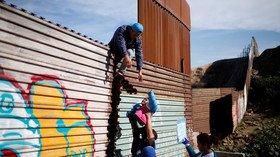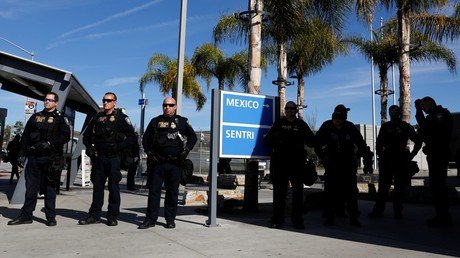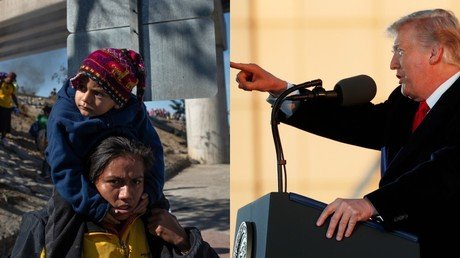‘US stole from Honduras more’: Migrants at US border demand $50k ‘reparations’ & faster processing

Two groups of Central American migrants, a fraction of the 7,000-strong human tide that massed at the border during US elections, are demanding speedy approval of their asylum claims – or $50,000 to go home.
One group of about 100 Hondurans has asked the Trump administration to pay them $50,000 each to leave if they could not enter the US. Arriving at the US Consulate on Tuesday morning, they delivered a letter harshly critical of US intervention in Central America and gave the Consulate 72 hours to respond.
“It may seem like a lot of money to you, but it is a small sum compared to everything the United States has stolen from Honduras,” said group leader Alfonso Guerrero Ulloa of the figure the group had settled upon for reparations. The letter also asked Trump to remove Honduran president Orlando Hernandez from office.
Ulloa said the group does not have a plan for what they will do if the US rejects their terms, but that $50,000 would at least be enough for caravan members to start a business if they must return home. He fled to Mexico 30 years ago after he was accused of bombing a Chinese restaurant and has lived outside Honduras ever since.
A second group of about 50 migrants asked the US to speed up the processing of asylum claims to admit 300 new arrivals per day at San Ysidro Port of Entry. The port currently allows between 40 and 100 asylum seekers through per day, a pace the group says violates both American and international law mandating immediate processing, and puts migrants at risk.
Also on rt.com US responsible for ‘misery & horrors’ forcing people to flee Latin America – ChomskyLed by Pueblo Sin Fronteras, the organization that organized the migrant caravans, the second group was able to secure a meeting with Mexican immigration officials, whom they asked to stop working with police to deport caravan members. About 15 members of the second group previously attempted a hunger strike in order to speed up the asylum process.
“A lot of people are leaving because there is no solution here,” said Tijuana resident Douglas Matute. “We thought they would let us in. But Trump sent the military instead of social workers.”
While neither group was aware of the other, both said their messages were well-received by the US Consulate. “It was nice to be treated with respect,” said Ulloa, while Xochitl Castillo, a member of the second caravan, received a “warm welcome” from “very kind” officials who promised to pass their letter on to Trump, Department of Homeland Security Secretary Kirstjen Nielsen, San Ysidro Port Director Sidney Aki and Commissioner of the Office of Customs and Border Protection Kevin McAleenan. Castillo did not give a deadline for a US response.
The migrant caravans have shrunk significantly, from close to 7,000 people who arrived in Tijuana a month ago seeking entry into the US. Castillo explained that 2,500 of the migrants have applied for humanitarian visas in Mexico, while 700 have voluntarily returned to their home countries and 300 have been deported. Many of the deportees were sent home last month after their attempt to rush the border was met with a volley of tear gas from US border patrol, who shut down the crossing for several hours. Another 3,500 migrants are assumed to have crossed illegally into the US or traveled to other Mexican border cities.
The letter from Castillo's group also criticized “US intervention in Central America” and characterized the caravans’ predicament as a “humanitarian crisis,” a possible nod to Tijuana mayor Juan Manuel Gastelum, who has used that term to refer to the migrants whose presence in his city has “hurt us.” Gastelum threatened to sue Pueblo Sin Fronteras for the damage caused by the caravans, whom he accuses of acting violently and disrespectfully toward the locals. Five thousand migrants were initially housed in a converted sports stadium in Tijuana, awaiting their chance to apply for refugee status.
Despite the diminished migrant “threat,” Trump continues to push for a border wall, threatening on Tuesday to shut down the government if the funding does not pass Congress by December 21. He previously threatened to cut off financial aid to Guatemala, El Salvador, and Honduras if they did not put a stop to the caravans before they reached the border, and has also accused Venezuela of sending its people northward.
If you like this story, share it with a friend!














